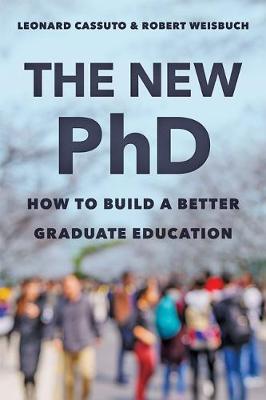The New PhD: How to Build a Better Graduate Education

The New PhD: How to Build a Better Graduate Education
This book examines the failed graduate school reforms of the past and presents a plan for a practical and sustainable PhD. For too many students, today's PhD is a bridge to nowhere. Imagine an entering cohort of eight doctoral students. By current statistics, four of the eight--50%!--will not complete the degree. Of the other four, two will never secure full-time academic positions. The remaining pair will find full-time teaching jobs, likely at teaching-intensive institutions. And maybe, just maybe, one of them will garner a position at a research university like the one where those eight students began graduate school. But all eight members of that original group will be trained according to the needs of that single one of them who might snag a job at a research university. Graduate school has been preparing students for jobs that don't exist--and preparing them to want those jobs above all others. In The New PhD, Leonard Cassuto and Robert Weisbuch argue that universities need to ready graduate students for the jobs they will get, not just the academic ones. Connecting scholarly training to the vast array of career options open to graduates requires a PhD that looks outside the walls of the university, not one that turns inward--a PhD that doesn't narrow student minds but unlocks and broadens them practically as well as intellectually. Cassuto and Weisbuch document the growing movement for a student-centered, career-diverse graduate education, and they highlight some of the most promising innovations that are taking place on campuses right now. They also review for the first time the myriad national reform efforts, sponsored by major players like Carnegie and Mellon, that took place between 1990 and 2010, look at why these attempts failed, and ask how we can do better this time around. A more humane and socially dynamic PhD experience, the authors assert, is possible. This new PhD reconceives of graduate education as a public good, not a hermetically sealed cloister--and it won't happen by itself. Throughout the book, Cassuto and Weisbuch offer specific examples of how graduate programs can work to: - reduce the time it takes students to earn a degree;
- expand career opportunities after graduation;
- encourage public scholarship;
- create coherent curricula and rethink the dissertation;
- attract a truly representative student cohort; and
- provide the resources--financial, cultural, and emotional--that students need to successfull
PRP: 261.00 Lei
Acesta este Prețul Recomandat de Producător. Prețul de vânzare al produsului este afișat mai jos.
234.90Lei
234.90Lei
261.00 LeiLivrare in 2-4 saptamani
Descrierea produsului
This book examines the failed graduate school reforms of the past and presents a plan for a practical and sustainable PhD. For too many students, today's PhD is a bridge to nowhere. Imagine an entering cohort of eight doctoral students. By current statistics, four of the eight--50%!--will not complete the degree. Of the other four, two will never secure full-time academic positions. The remaining pair will find full-time teaching jobs, likely at teaching-intensive institutions. And maybe, just maybe, one of them will garner a position at a research university like the one where those eight students began graduate school. But all eight members of that original group will be trained according to the needs of that single one of them who might snag a job at a research university. Graduate school has been preparing students for jobs that don't exist--and preparing them to want those jobs above all others. In The New PhD, Leonard Cassuto and Robert Weisbuch argue that universities need to ready graduate students for the jobs they will get, not just the academic ones. Connecting scholarly training to the vast array of career options open to graduates requires a PhD that looks outside the walls of the university, not one that turns inward--a PhD that doesn't narrow student minds but unlocks and broadens them practically as well as intellectually. Cassuto and Weisbuch document the growing movement for a student-centered, career-diverse graduate education, and they highlight some of the most promising innovations that are taking place on campuses right now. They also review for the first time the myriad national reform efforts, sponsored by major players like Carnegie and Mellon, that took place between 1990 and 2010, look at why these attempts failed, and ask how we can do better this time around. A more humane and socially dynamic PhD experience, the authors assert, is possible. This new PhD reconceives of graduate education as a public good, not a hermetically sealed cloister--and it won't happen by itself. Throughout the book, Cassuto and Weisbuch offer specific examples of how graduate programs can work to: - reduce the time it takes students to earn a degree;
- expand career opportunities after graduation;
- encourage public scholarship;
- create coherent curricula and rethink the dissertation;
- attract a truly representative student cohort; and
- provide the resources--financial, cultural, and emotional--that students need to successfull
Detaliile produsului










